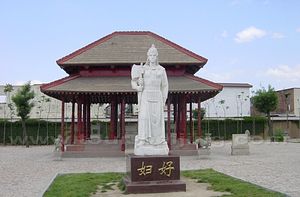This is the fifth in a series about the basic knowledge and beliefs of the Chinese People’s Liberation Army (PLA) based on the old PLA’s Soldier’s Handbook. This installment looks at two remarkable military figures from China’s past who retain their significance today.
Lady Hao
In 1976, not long after the discovery of Emperor Qin’s army of the dead, archaeologists untangled an equally astounding strand of history: the tomb of Fu (or Lady) Hao (ca. 1200 BCE), wife of Shang Emperor Wu Ding. In addition to her honorific title of Empress Consort Xin, Fu Hao was also high priestess, enfeoffed noble, and a general of note. Fu Hao is said to be the first recorded Chinese woman warrior, a true historical Hua Mulan. Her military achievements included leading as many as 13,000 soldiers in Shang armies against the fearsome Qiang, Yi, and Tufang tribes. Fu Hao’s burial reflected her achievements in life, taking with her well over 1,000 distinct articles, many of them honoring her military achievements.
Fu Hao traced her path to power along her emperor’s favor. Although the Shang Dynasty (16th – 11th century BCE) was not known for liberal gender practices, Wu Ding is said to have given similar honors to other women, although Fu Hao stood first among them. Her modern day successor would most likely be Jiang Qing, last wife of Mao Zedong. But while Jiang is most remembered for her reign of terror (in part to let Mao off the hook), the only evidence we have of Fu Hao tells us of her exemplary accomplishments as warrior and priestess.
The PLA today takes great pride in its female units, although women in the PLA still tend to take on the role of performer more than full-fledged member of the fighting forces, a role exemplified by Peng Liyuan, China’s first lady and wife of President Xi.
Mo Zhai
Best known as a philosopher and statesman during the Spring and Autumn and Warring States periods, Mo Zhai (475-395 BCE) was also a reformer in the field of weapons technology. He was a carpenter for quite some time and became a master designer of machinery, in particular of defensive implements. Later in life, he elevated himself from carpentry to philosophy but never forgot his roots.
The end of the Spring and Autumn period was a time of social disturbance when the aristocracy loosened its hold on society. Representing the interests of craftsmen and freeholders, Mo Zhai was dissatisfied with the old ways of Confucianism and its ideal of “courtesy,” in which those of lesser rank were expected to give deference to superiors while depending on them for sustenance. “Benefiting all and preventing injury to all” became his standard for thought and action, a shift in focus from deference to common benefit. He believed that “not every official has merit, nor is every commoner without it” and called for “food for the starving, clothing for the naked, rest for the worker.” The core of his philosophy was universal love.
Indeed, Mo Zhai was none other than Mencius, Chinese philosopher of fame. His focus on defensive armaments parallels China’s statement that it “pursues a national defense policy which is purely defensive in nature.” Could it be that China too will later pursue a policy of universal love?
The views expressed are my own and do not reflect the official policy or position of the U.S. Navy, Department of Defense, or the U.S. Government.

































